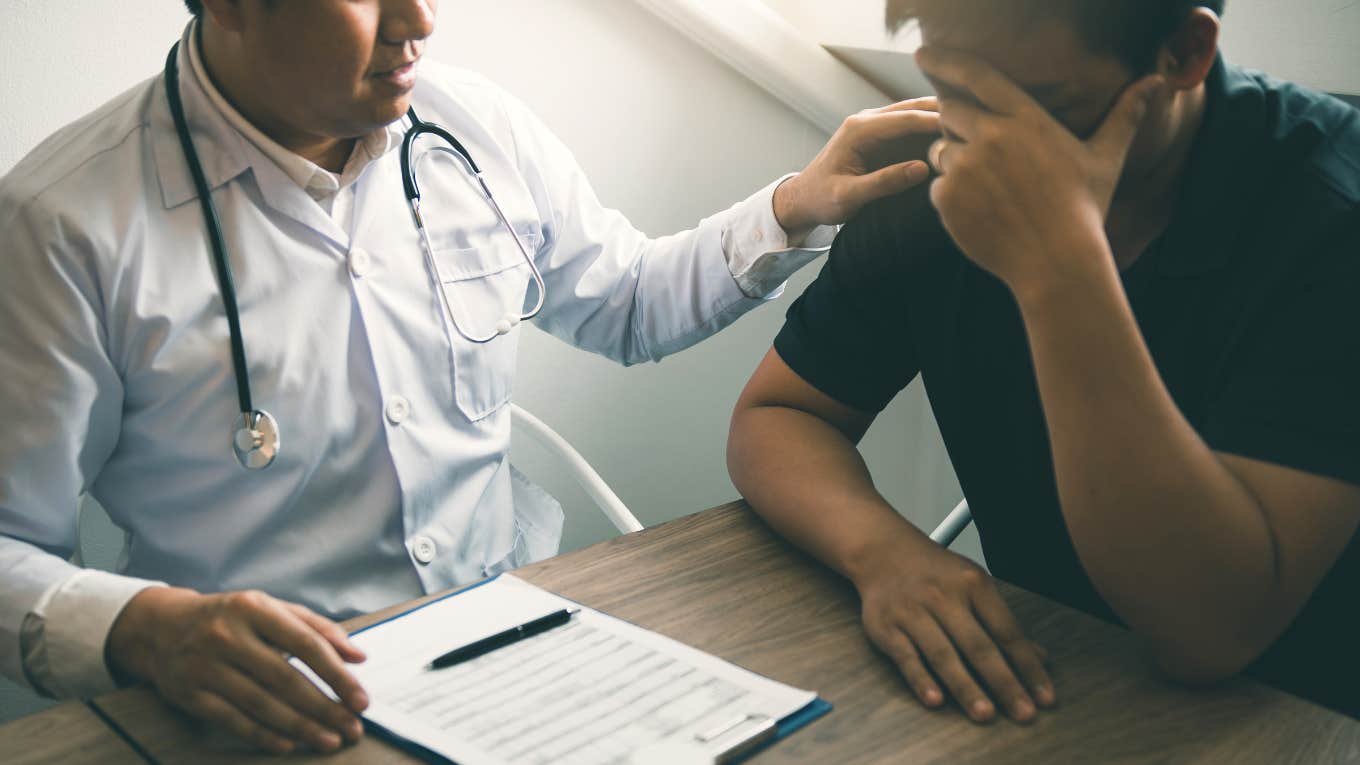Psychiatrist Shares The One Thing He Wishes He Could Tell His Patients About Their Mental Health, But Usually Doesn’t
Sometimes, simple steps can help us feel better.
 wutzkoh / Canva Pro
wutzkoh / Canva Pro Dr. Richard Wadsworth uses his presence on TikTok to offer guidance on the intersection of physical and mental health, which he believes are ultimately connected.
The psychiatrist shared the one thing he wants to tell patients about mental health but usually doesn’t.
Dr. Wadsworth explained the key connection between working out and mental health, saying, “If you’re depressed and you aren’t exercising, most likely, that’s why, just from a statistical perspective.”
“Statistically, if you were exercising, you probably wouldn’t be depressed,” he reiterated. “You almost definitely wouldn’t be as depressed.”
He mentioned that some people counter by saying they’re too depressed to exercise, to which he asks if that person can exercise for one second, then advises them to try and do that for two seconds, building up to 30 seconds.
“That’s probably gonna help you feel good enough to maybe go for a whole minute, and if you keep doing that, you might even be able to do five minutes,” and then eventually, even ten minutes. “At some point, you may be able to work up to 30 minutes, and if you get up to 30 minutes, you’re probably not gonna be depressed enough to even need to see me or see a psychiatrist,” he explained. “You’re probably, statistically, going to be mostly functional.”
 Photo: mikotoraw photographer / Pexels
Photo: mikotoraw photographer / Pexels
He addressed the reasons why he doesn’t give this advice to people, even though “statistically, according to the studies they’ve done, it’s usually accurate.” He described the studies done, detailing how “they took a big group of depressed people” and had half exercise, while the other half didn’t exercise.
“Out of the group that exercised, they outperformed the depression medications,” he revealed. “More people got to feeling better with exercise than they did with pills, or better than the group that was taking pills.”
As a way to explain his thought process further, he used the analogy of trying to build a fire inside a bucket of water, saying, “That’s almost what it’s like trying to continue to be happy or happier if you’re not exercising. It makes about as much sense as trying to build a fire in a bucket of water: It’s not gonna work.”
“Now, there’s definitely a big difference between being happy and depression,” he clarified. “Also, there’s lots of causes of depression, and certainly not all of them are not exercising. But I would say that for most causes of depression, the symptoms would lessen if the person did exercise.”
He highlighted a major challenge of depression: A depressed person’s brain convinces them that nothing will make them feel better.
“That’s part of what depression is,” he shared. “It’s the state of having your brain lie to you and telling you that nothing you do will ever make you feel any better. Studies have demonstrated that that is false: The depressed brain is a liar.”
“You stop engaging in any of your hobbies, you don’t go outside, you don’t exercise, you don’t do anything. And guess what? You get more and more depressed, and then finally get so bad that you either go to the hospital or you go see a psychiatrist,” he said.
He detailed that “a lot of the studies on pills people take … have five-week effects. Maybe 25-40% of the time, they help people feel a little better for about five weeks, and then the effects kind of drop off, and they stop working … They try different pills and try different combinations of pills, but nothing lasts unless you make changes.”
 Photo: Alex Green / Pexels
Photo: Alex Green / Pexels
He advised that people try to recognize that “you have a window there, maybe about five weeks before the medication stops working. During that five-week window, try very, very hard not to listen to your brain when it tells you that nothing you do will make you feel any better.”
He suggested that people push forward despite what their brains say, by engaging with the people and things they love.
He also acknowledged that people can go through severe depressive episodes where they need alternative treatments, beyond medicine and exercise.
“Don’t give up hope,” he said. “There are lots of things that can be done.”
Making small, actionable changes, like telling yourself positive affirmations and getting into a routine that uplifts you are ways someone can combat a downturn in their mental health.
“Some people do need to be on a depression medication chronically; that’s just the way it is, for whatever reason,” he clarified. “And that’s okay. There’s no shame in that. But if your depression medications aren’t working, and you’re not exercising, and you’re not spending time with other people, you’re not pursuing hobbies, start with one second of exercise.”
He ended with a message of hope, sharing that getting professional help is always an avenue for people seeking support.
Whether that support involves working with a doctor or therapist to create an action plan in conjunction with medication or it involves talking through hard times, prioritizing your health is imperative because once you put yourself first, you've made the most important step towards healing.
Alexandra Blogier is a writer on YourTango's news and entertainment team. She covers mental health, pop culture analysis, and all things to do with the entertainment industry.
